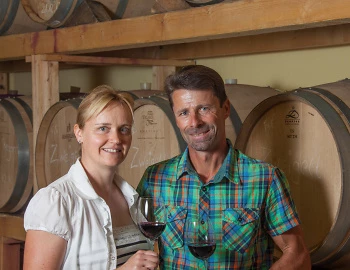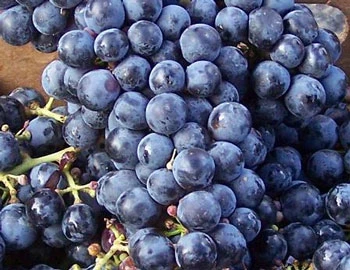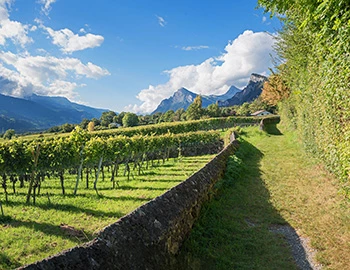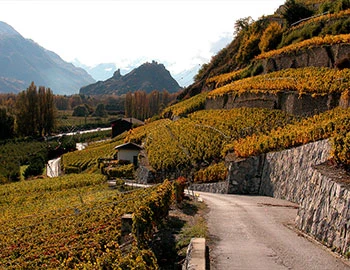Cuvée 1844 Cabernet Franc 2022
AOC Zürich, Roland und Karin Lenz, 750 ml

| Grape variety: | Cabernet Franc |
| Producer: | Roland und Karin Lenz |
| Origin: | Switzerland / Ostschweiz / (AOC) Zürich |
| Other vintages: |
Description
Typically, «the Frenchwoman» or Cabernet Franc, plays a harmonising role as a cuvée partner in great Bordeaux wines or as a strong-willed soloist In the Loire region. Here in the Canton of Zurich she shines as an independent solitaire whose character reminds one of a noble relative from Bordeaux. Her complex nosegay exudes sour cherries, hibiscus blossoms, cedar, bread crust, white pepper, noble smoke and tea leaves unite as a spicy-fruity composition. From the very first sip its elegant fullness and soft, juicy characteristics are evident, rendering her a truly charming and well-balanced Cabernet Franc. On the palate, aromas of prune, blackberry, orange zest, almond and tobacco interweave densely. Combine it with a cutlet and Mediterranean risotto, lamb fillet, grilled «Wiedikerli» bratwurst, or however you please.
Attributes
| Origin: | Switzerland / Ostschweiz / (AOC) Zürich |
| Grape variety: | Cabernet Franc |
| Label: | Vegan, Certified organic or biodynamic wine |
| Ripening potential: | 1 to 8 years after harvest |
| Drinking temperature: | 16 to 18 °C |
| Food Pairing: | Cold fish dish, dried meat, Spiced grillades, Crispy roast chicken, Cheese board |
| Vinification: | long must fermentation, Punching down, soft pressing, saignée |
| Harvest: | hand-picking |
| Maturation: | in partly new and used barriques/ Pièces, short cultivation |
| Bottling: | no filtration |
| Volume: | 13.0 % |
| Note: | Contains sulphites |
Roland und Karin Lenz
In 1994, while Roland Lenz was still studying oenology, he and his wife Karin were able to acquire eight hectares of vines on the Iselisberg. It was a unique opportunity that they seized, even though they were toying with the idea of setting up their own business abroad, far from Switzerland. They actually did so later, but that's another story…
It is only in the last two decades that the Canton of Thurgau has really come to the attention of wine lovers as a wine-growing area. Its apple orchards and the apple juice (must) pressed from the picked fruit have always been popular, inevitably earning the canton its nickname of «Must India». Viticulture, however, has existed in this region for centuries.

Cabernet Franc
Forefather of the Bordeaux varieties
The Cabernet Franc is one of the oldest varieties of Bordelais and a parent of three other red grapes in the Bordeaux assortment: Cabernet Sauvignon, Merlot and Carmenère. It is distinguished by its complex, flavourful bouquet of raspberry, graphite, violet, liquorice and white pepper. In addition, it presents round, crisp tannins which turn out less strongly than those of Cabernet Sauvignon. While the Cabernet Franc always appears as part of a blend in Bordeaux, it is pressed alone on the Loire. The most renowned appellations are Chinon and Bourgueil. Incidentally, the Cabernet originates not in Bordeaux but in the Spanish Basque Country. Cabernet owes its name to the Latin “carbon”, meaning black.

Ostschweiz
Eastern Switzerland: an intriguing puzzle
Eastern Switzerland has long been positioned on the northern rim of the climate zone where the cultivation of popular Swiss varieties is possible. Due to a warming climate, the vineyards of Aargau, Zurich, Schaffhausen, Thurgau and Graubünden are now in the zone where varieties such as Müller-Thurgau or Pinot Noir succeed excellently. But even long-established, almost-forgotten varieties such as Elbling, Räuschling and Completer are experiencing a renaissance.

Switzerland
Switzerland – A small country with enormous diversity
Switzerland is famous for its banks, watches, and cheese, but not necessarily for its wine. The Swiss didn't invent wine, but they have been extremely open and curious to it. Wine culture arrived in what is now modern Switzerland via several routes: from Marseilles to Lake Geneva and the Lower Valais region; from the Aosta Valley through the Great St. Bernard Pass to the rest of Valais; from the Rhone through Burgundy, across the Jura Mountains to Lake Constance; and from Lombardy to Ticino, and then on to Grisons.



